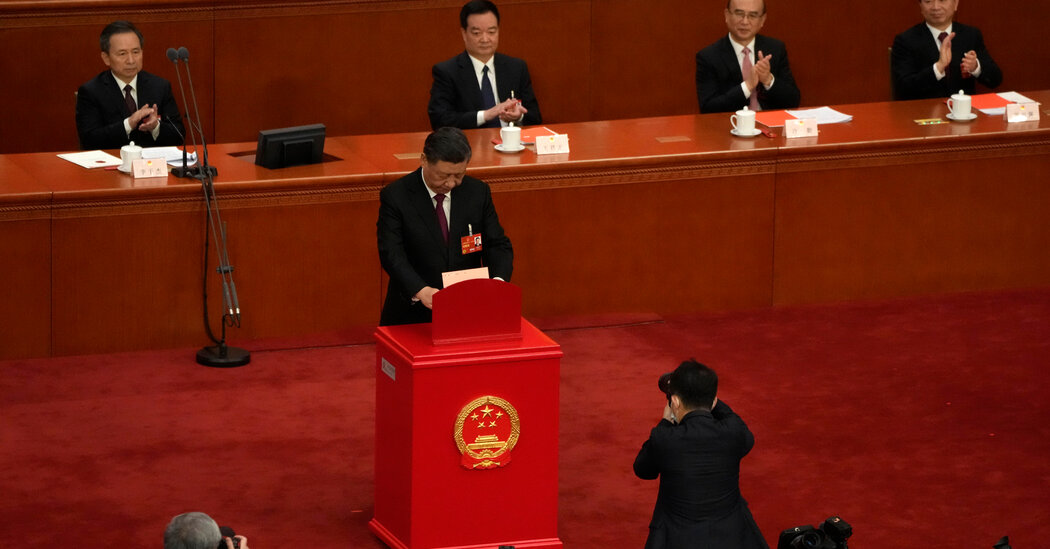
Xi Starts New Term in China, With a Focus on Economy and U.S. Rivalry
As he enters his new term as China’s president and most powerful leader in decades, Xi Jinping is signaling that he is steeling for an era of superpower contestation, even as he seeks to revive a battered economy.
There was never serious doubt that Mr. Xi, as dominant as any Chinese leader since Mao Zedong, would be endorsed for a third five-year term as state president at an annual meeting of the National People’s Congress, the top legislature. He had already, in October, secured five more years in the more powerful role of Communist Party general secretary. On Friday, 2,952 congress delegates — picked for their loyalty to the ruling Communist Party — duly delivered, voting unanimously to keep Mr. Xi as president.
But with his personal power seeming secure, Mr. Xi faces the urgent challenge of reviving China’s economy, which faltered under three years of stringent Covid restrictions, crackdowns on property developers and tech giants, and escalating tensions with the United States and its allies.
Mr. Xi used the past week at the congress to project determination to reinvigorate China’s economy. That message has been coupled with a rallying cry for the nation to unite behind him in confronting challenges posed by Western powers that he says are seeking to contain China’s rise.
Some investors in China and abroad had expected, or hoped, that the pressing need to restore growth would lead Mr. Xi to loosen the state’s grip on the economy and make moves to ease geopolitical tensions. For now at least, Mr. Xi has signaled that even as China seeks to repair its economy, he is prepared to push back against the United States over its sanctions and restrictions on Chinese firms and its expanding military deployments around Asia.
Mr. Xi and President Biden had been moving to rein in tensions, but their efforts have been overtaken by disputes over a Chinese surveillance balloon and the Biden administration’s accusation that Beijing was considering sending lethal support for Russian forces fighting in Ukraine. The Chinese foreign minister, Qin Gang, said this week that Beijing “has not provided weapons to either side of the conflict.”
“This period is going to be an important one for seeing whether Xi is repentant or unbowed. I wouldn’t expect him to change a lot of the essentials,” Christopher K. Johnson, a former C.I.A. analyst who is a senior fellow at the Asia Society’s Center for China Analysis, said in an interview. “Xi is not on a ‘charm offensive’ where he is looking to correct the error of his ways.”
The legislature is set to approve an increase of 7.2 percent to China’s military spending this year, enhancing the potential of the People’s Liberation Army to project power far from Chinese shores. Mr. Xi also declared that China faced “all-around containment, encirclement and suppression” by the United States and its allies.
“In the coming period, the risks and challenges that we’re facing will only become more and more numerous and grim,” Mr. Xi said, while urging officials to remain “calm and focused” while also braced for “struggle.”
To tackle these challenges, Mr. Xi has emphasized the need for China to wean itself off its reliance on Western-held technologies and expertise, and to fortify itself against risks to food and energy security. He has populated the government’s top ranks with his loyalists and allies to carry out his agenda.
Mr. Xi’s No. 2, the incoming Chinese premier, Li Qiang, is expected to focus on growth. The party’s sweeping “zero Covid” policy of lockdowns and quarantines resulted in growth of 3 percent last year, lower than expected. Unemployment among urban youth rose to nearly 20 percent in the worst months of 2022.
“I’m optimistic that as soon as the National People’s Congress is over, and Li Qiang has fully taken over, then China is going to roll out measures to boost the confidence of the private sector,” said Wang Xiangwei, a former chief editor of The South China Morning Post, a newspaper in Hong Kong.
“If you want to revive the Chinese economy, you have to rely on the private sector,” Mr. Wang, who now writes a newsletter on Chinese politics, said in an interview. “However, the private sector has been hit so hard that mere words to soothe their concerns is not enough.”
Mr. Xi and his top lieutenants have not yet offered specific responses to the deep concerns in China’s private business community about the increasingly intrusive role of the government and restrictions on private investment. The government has been requiring companies to transfer a small stake and a seat on the board to the government and ordering companies to nurture and consult closely with Communist Party cells in their work forces. Even as China tries to restore investor confidence, many of those policies may stay.
“Because they’re now facing what they take to be an insecure environment at home and abroad, they’re really taking steps to concentrate power, not to let go of it,” Kou Chien-Wen, a professor at National Chengchi University in Taipei who specializes in Chinese politics, said of China’s leaders.
Amy Chang Chien contributed reporting, and Li You contributed research.
